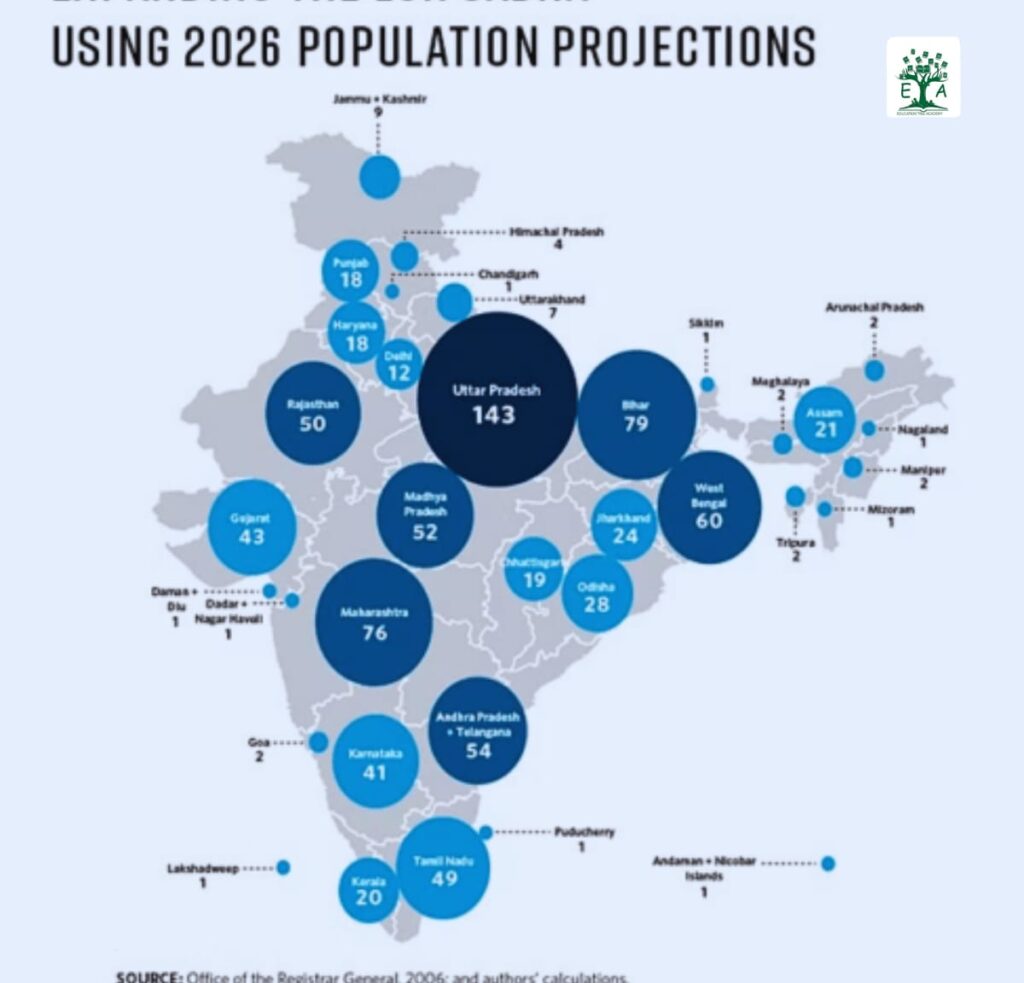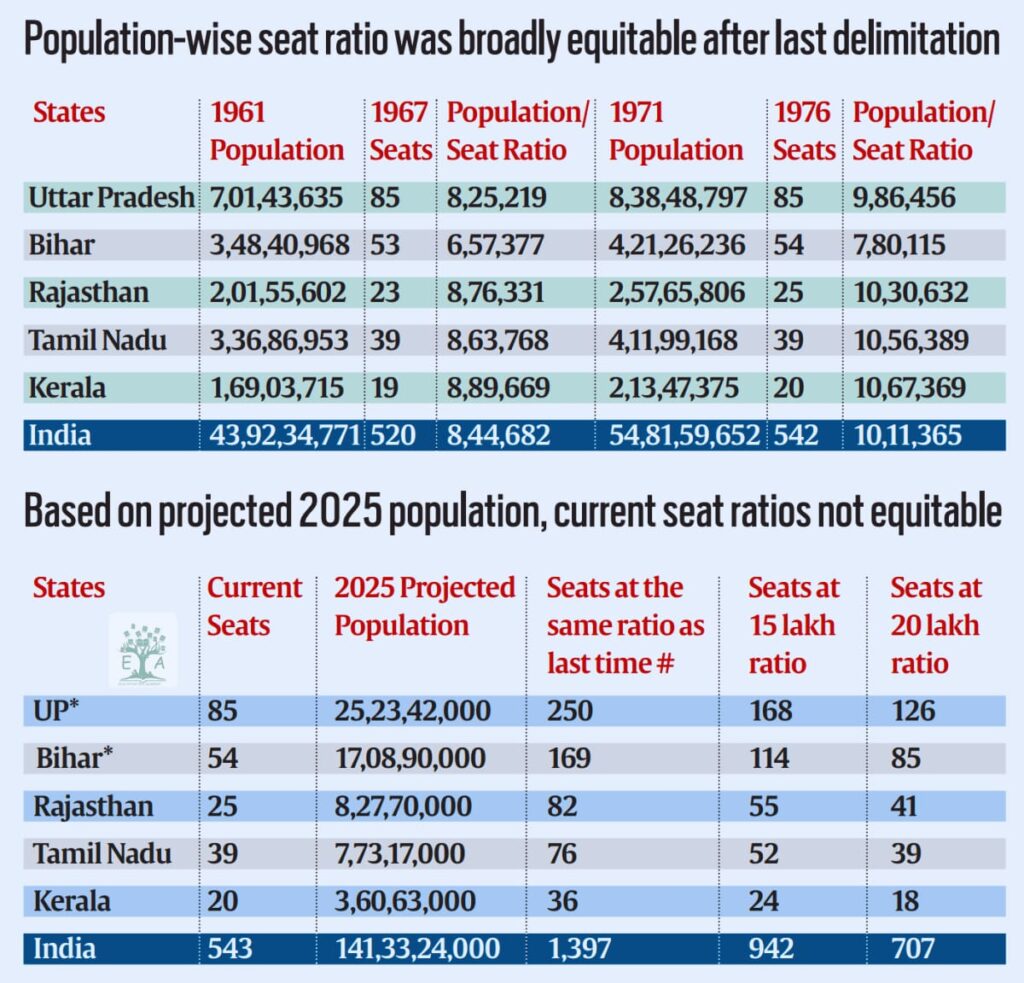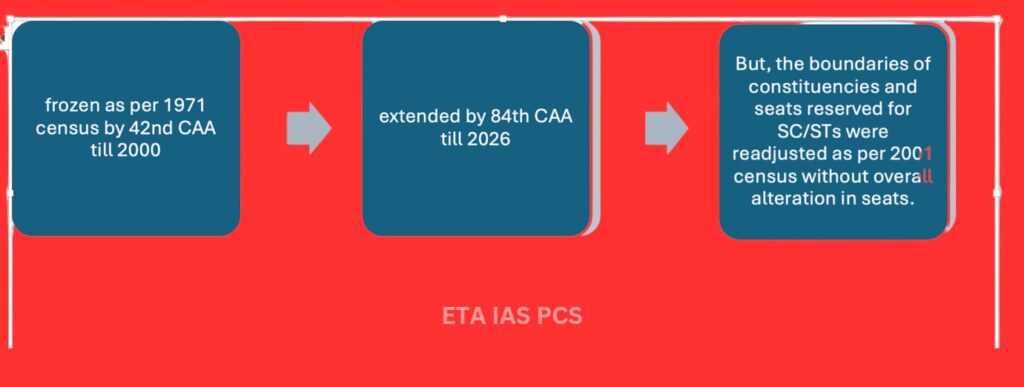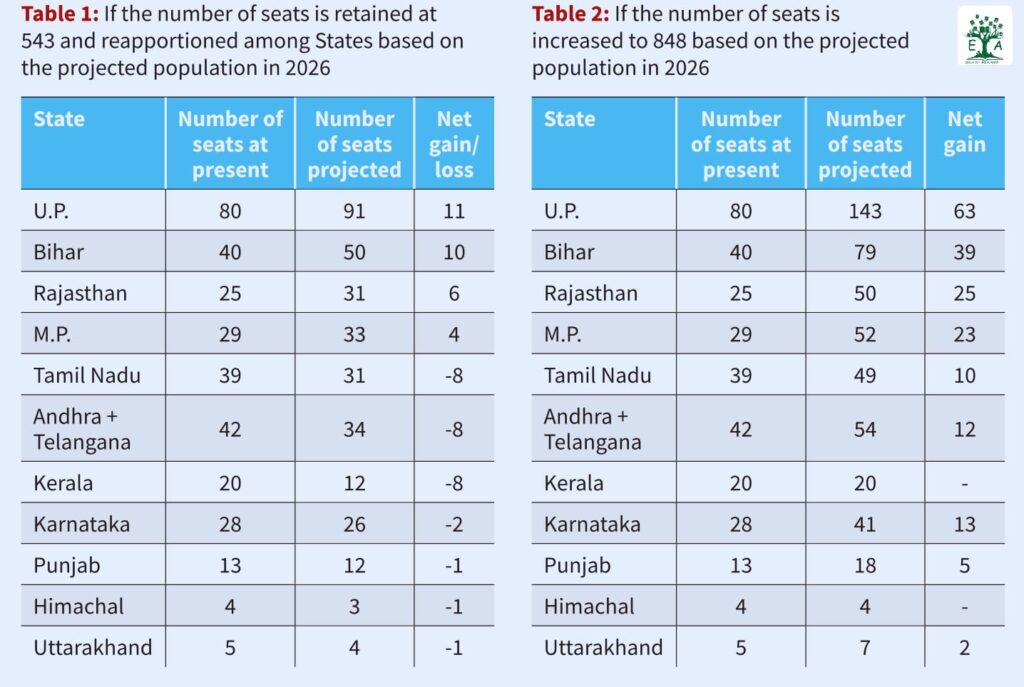The Union Home Minister of India stated that the delimitation process will not impact the southern States, as the allocation of new seats will be conducted on a pro rata basis. He assured that the southern States would receive their fair share of any increase in representation.
Constitution 106th Amendment Act:
- The Act aims to allocate one-third of the seats for women in the Lok Sabha and State Legislative Assemblies.
- The allocation will take place after the delimitation process.
Concerns Raised by Southern States:
- Southern states have expressed concerns regarding the delimitation process.
- They argue that their efforts to manage fertility could lead to a reduction in their representation in the legislature.
- There are also worries about potential reductions in financial allocations to these states as a result of the delimitation.

Background on Seat Allocation:
- The allocation of seats for the Lok Sabha has been suspended since the 1972 census.
Constitution 106th Amendment Act:
- The Act aims to reserve one-third of the seats for women in both the Lok Sabha and State Legislative Assemblies.
- The reservation will be implemented after the delimitation process is completed.
Concerns from Southern Indian States:
- Southern states have raised concerns about the delimitation based on the most recent population statistics.
- These states fear that the delimitation may reduce their representation in Parliament.
- There are concerns that efforts to manage fertility rates could lead to a decrease in both political representation and financial allocations.

Definition of Delimitation:
- Delimitation is the process of redefining the boundaries of electoral constituencies or districts.
Purpose of Delimitation:
- It ensures that each constituency has a relatively equal voter population, following the principle of “one vote, one value.”
Adjustments Post-Census:
- After each census, adjustments are made:
- (a) The allocation of seats in the Lok Sabha to the States.
- (b) The division of each state into territorial constituencies.
- These adjustments were carried out after the 1951, 1961, and 1971 census
- After each census, adjustments are made:
Constitutional References:
- Adjustments are outlined in:
- Article 82 for the Lok Sabha.
- Article 170 for State Legislative Assemblies.
- Adjustments are outlined in:
Parliament’s Role:
- Parliament has the authority to establish the procedures and the governing body responsible for conducting delimitation

Importance of Delimitation:
- Delimitation is necessary due to the changing distribution of the population.
- Some regions experience significant population growth, while others may see a decline.
- This disparity can result in an imbalance in voter representation, with some constituencies having far more or fewer voters than others.
Establishment of the Delimitation Commission:
- The Delimitation Commission is established by the President of India.
Composition of the Delimitation Commission:
- The Chief Election Commissioner (CEC) or an Election Commissioner designated by the CEC.
- A retired or serving Judge of the Supreme Court.
- The Election Commissioner of the relevant State.
Authority and Decision-Making:
- The decisions made by the Delimitation Commission are not subject to judicial review in any court.
Presentation of Decisions:
- Copies of the decisions are presented to the House of People (Lok Sabha) and the respective State Legislative Assembly.
- These bodies are not allowed to make any alterations to the orders.
Constitutional Stipulations for Delimitation:
- Articles 82 and 170 of the Indian Constitution outline the delimitation process.
- Article 82 governs the delimitation process for the Lok Sabha.
- Article 170 governs the delimitation process for State Legislative Assemblies.
- Articles 82 and 170 of the Indian Constitution outline the delimitation process.
Provision for Suspension of Delimitation:
- There is a constitutional provision that allows for the suspension of the delimitation exercise.
Impact of Delimitation:
Balancing Political Power (Gerrymandering):
- Delimitation can reshape the allocation of political power across regions and communities.
- Redrawing constituency boundaries can influence the electoral viability of political parties and candidates.
- Example: In the 2008 delimitation, Jharkhand saw a significant shift in political power as constituency boundaries were redefined.
Addressing Demographic Changes:
- In 2002, states like Maharashtra and Tamil Nadu underwent constituency redefinition to accommodate population growth in urban areas.
- This adjustment ensured more accurate representation of demographic shifts, particularly for urban centers.
Minority Representation:
- Delimitation has enhanced the representation of minority groups.
- Example: The 2008 delimitation process established constituencies in areas with high minority populations, such as Malappuram in Kerala.
Enhanced Gender Representation:
- Delimitation initiatives have also improved gender representation in politics.
- Example: During the 2008 delimitation, some states redrew constituency boundaries to facilitate the reservation of seats for women in local governance.
Fair Representation:
- The primary goal of delimitation is to ensure equitable representation by adjusting constituency boundaries based on population changes.
- This process helps balance the number of voters per representative, upholding the democratic principle of “one person, one vote.”
Issues Associated with Delimitation:
- Delimitation may lead to reduced representation for states that have reached population stabilization, such as Kerala and Tamil Nadu.
- Conversely, states with ongoing population growth may see an increase in representation.

Issues of Minority Representation:
- The Sachar Commission recommended that constituencies with a high minority population should not be reserved for Scheduled Castes.
- Despite this recommendation, there have been reports of non-compliance with these principles in the recent delimitation exercise in Assam.
Challenges in Delimitation Exercises:
- Delimitation exercises often face implementation challenges due to logistical and administrative issues.
- Example: The delimitation exercise planned for Jammu and Kashmir faced delays and obstacles due to the unique circumstances and complexities of the region.
Roadmap for Future Delimitation:
- It is crucial that the delimitation process is equitable, transparent, and considers the interests of all communities and regions.
- WHAT ARE THE OPTIONS AVAILABLE?
Option 1:
- The Delimitation Commission may decide to freeze the allocation of seats until all states achieve population stabilization.
Option 2:
- The Delimitation Commission could create a tailored mathematical model based on the ‘Cambridge Compromise’.
- This model would aim to establish a mathematically just formula for seat allocation, similar to the seat distribution in the European Parliament.
- #Best Practice: This approach is considered a best practice for achieving fairness in representation.
Option 3:
- The Punchhi Commission has suggested that states should receive equal representation in the Rajya Sabha, similar to the American Senate model.
- This approach could help balance the power dynamics among states in the Lok Sabha and ensure that states do not lose their representation and voice in the Rajya Sabha.
Option 4:
- The number of seats in the Lok Sabha may be capped at 543.
- The number of MLAs in each state could be increased based on current population figures.
- This adjustment could help reconcile the democratic and federal principles involved in the delimitation process
Q. How many Delimitation commissions have been constituted by the government of India till December 2023?
A. One
B. Two
C. Three
D. Four

Thank you ( ETA) for providing current affairs and its videos according to the demand of examination 🙏.